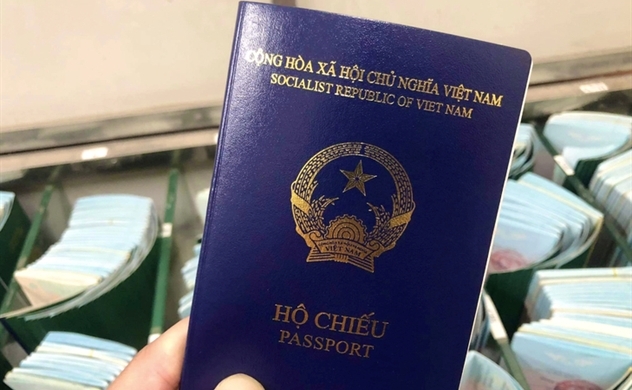Vietnam passport power jumps 6 places on Henley index

A Vietnamese passport. Photo courtesy of Young People newspaper.
According to its Global Mobility Report Q3/2023, Vietnam shared its rank with Cambodia, Guinea-Bissau and Mali in the third quarter listing. The index covered 199 different passports and 227 different travel destinations.
Vietnamese citizens holding ordinary passports currently enjoy free access to 55 countries and territories.
Southeast Asian countries that scored lower than Vietnam were Laos and Myanmar, ranking 87th and 89th, respectively.
Singapore held on to the number one position with the most powerful passport in the world, with citizens able to visit 192 countries and territories without a visa.
In contrast, the world’s weakest passports were from poor countries mired in conflict, including Syria, Iraq and Afghanistan. Passport holders from these nations can only visit 27-30 countries and territories without visas.
Vietnam’s visa-free destinations include the Cook Islands, Micronesia, Niue, Barbados, Haiti, Oman, Saint Vincent & the Grenadines, Dominica, Brunei, Cambodia, Singapore, Laos, Kazakhstan, Kyrgyzstan, Indonesia, Malaysia, Myanmar, Philippines, Thailand, Chile, Ecuador and Panama.
The Henley Passport Index is an original, authoritative ranking of all the world’s passports according to the number of destinations their holders can access without a prior visa. The index is based on exclusive data from the International Air Transport Association (IATA) - the largest, most accurate travel information database - and enhanced by Henley & Partners’ research team.
In March 2022, Vietnam completely reopened tourism activities after a prolonged hiatus due to the Covid-19 pandemic, welcoming international visitors earlier than many countries in the region. The tourism market has gradually recovered, while domestic tourism has rebounded strongly.
However, the number of international tourists to Vietnam fell sharply in 2022 to only 3.5 million, hitting 70% of the year’s five million target, according to the Vietnam National Administration of Tourism. The decrease was derived from China’s ‘Zero-covid’ policy, Vietnam’s limited visa policy, the Ukraine- Russia war, and the global economic downturn in the last months of the year.
On June 24, Vietnam’s National Assembly approved a government proposal to extend the validity of tourist e-visas to 90 days with multiple entry, starting August 15. The National Assembly also agreed to extend the stay of visitors from countries that are unilaterally exempt from visas from 15 to 45 days.
This adjustment will also take effect on August 15. As of now, citizens of 25 countries can travel to Vietnam without a visa, and they are allowed to stay in the country for 14 to 30 days on average.
The number of foreigners visiting Vietnam in January-June was nearly 5.6 million, up 9.3 times year-on-year, but just 66.7% of the same period in pre-pandemic 2019.
Source: The Investor

 TIẾNG VIỆT
TIẾNG VIỆT 

_131447820.png)














